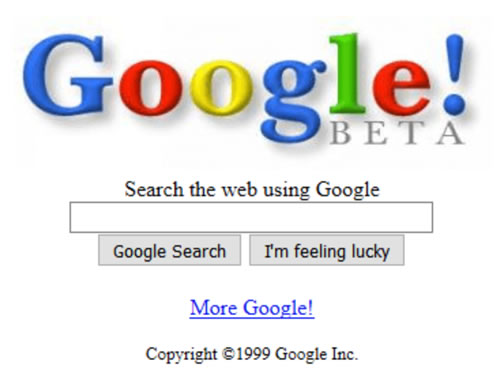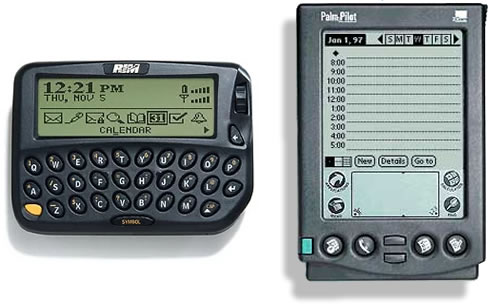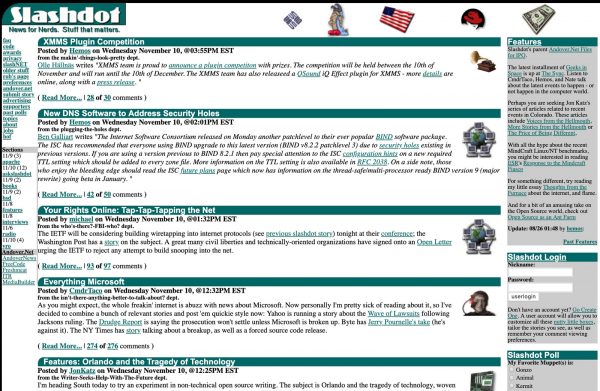Slashdot’s home page, as it appeared on November 10, 1999.
Almost 20 years ago, back in November 1999, a story that was trending on Slashdot (in case you weren’t on the web then, think of a late-’90s version of Reddit, aimed mostly at techies): the final exam for a course called The Future of Computing. The course covered technologies that didn’t yet exist but were expected soon, and the exam presented a set of 11 situations that could be solved with some combination of these technologies.
It was the final exam’s 11th situation that had captured the imaginations of Slashdot readers:
You live in North Korea.
Three days ago the soldiers came to your tiny patch of farmland and took the few scraps of food they hadn’t taken the week before. You have just boiled the last of your shoes and fed the softened leather to your 3-year-old child. She coughs, a sickly sound that cannot last much longer.
Overhead you hear the drone of massive engines. You look into the sky, and thousands of tiny packages float down. You pick one up. It is made of plastic; you cannot feed it to your daughter. But the device talks to you, is solar powered, and teaches you how to use it to link to the Web.
You have all the knowledge of the world at your fingertips; you can talk to thousands of others who share your desperate fate. The time has come to solve your problem in the most fundamental sense, and save the life of your daughter.

Try to imagine what this question would look like to someone reading this in November 1999. North Korea wouldn’t have been all that different — there was just a different Kim in charge. But technologically speaking, it was a different world:
- Desktop and laptop computers had processors running at speeds from 75 to 750 Mhz, anywhere from 16 to 128 MB of RAM, and hard drive capacities in the tens of gigabytes.
- Internet access for most people would’ve been considerably slower. I had a 56K modem back then, which meant that it would take about 3 minutes to download 1MB of data.
- Google was still in beta; if you were searching the web, you were probably using Yahoo! and AltaVista. There was no Facebook or Twitter — the closest equivalents would be SixDegrees.com and Napster.
- The first of what we think of as smartphones wouldn’t even be announced for another eight years. The first BlackBerry device, the 850, was primarily for email and had very limited web browsing capability. If you had a handheld computing device in 1999, it was probably a PalmPilot.

As I mentioned earlier, the problems that you’re supposed to solve in the exam assume the existence of technologies that weren’t part of the internet in 1999. When you read the final exam below, ask yourself: How would you tackle the exam’s problems using the non-theoretical, real internet of 2019?

Final Exam
A new version of the Web springs to life with the following enhanced capabilities:
- Unforgeable pseudonymous identities
- Bidirectional, typed, filterable links
- Arbitration agents*
- Bonding agents
- Escrow agents
- Digital Cash
- Capability Based Security with Strong Encryption
Pick any 5 of the essay questions below. Identify which advanced features listed above are needed to solve each problem, and explain how those features would work together.
Note: I doubt that anyone will choose Question 11 as one of their 5 questions to answer, because it requires a far more extensive answer than the others. But…if you can answer Question 11 in your own mind, even though you choose not to write up that answer for this examination, then a most remarkable thing will happen: you will walk out of this class with something profoundly worth knowing.
1) Searching for a decision analysis tool on the Web, you find a review in which the reviewer raves about a particular product. You buy the product and discover it just doesn’t work. You desire to prevent this person’s ravings from harming anyone else–and you desire to prevent the product from disappointing anyone else.
2) A product you buy based on a rave review opens your email address book, grabs your entire list of friends, sends itself to them, and sends your password files to a mysterious IP address. It’s too late now, but which features would you install before ever touching your computer again?
3) A product is advertised on the Web. It sounds good, but the offerer has no Web reputation. What arrangement would you consider adequate to go ahead and procure the product (Note: there are several possible answers; give 2 entirely separate solutions, and that is considered answering 2 questions).
4) You start receiving thousands of emails from organizations you don’t know, all hawking their wares. You want it to stop, just stop!
5) You wish to play poker with your friends. They live in Tampa Florida, you live in Kingman. This is illegal in the nation where you happen to be a citizen. You want to do it anyway.
6) You hear a joke that someone, somewhere, would probably find offensive. You wish to tell your precocious 17-year-old daughter, who is a student at Yale. The Common Decency Act Version 2 has just passed; it is a $100,000 offense to send such material electronically to a minor. You want to send it anyway–it is a very funny joke.
7) Someone claiming to be you starts roaming the Web making wild claims. You want to make sure people know it isn’t really you.
8) You have brought out a remarkable new product. There is a competing product making claims you know are false. You want to make sure anyone going to their site finds out your product is better.
9) Your elderly aunt sees a drug advertised on the Web that promises relief from arthritis. She dies shortly after starting to take the drug. You think the drug, and the company that made it, is at fault. Meanwhile the company is sure they didn’t have anything to do with it. You want justice.
10) You are the CEO of Bloomberg News, one of the most prestigious (and expensive) stock information services in the world. An article circulates on the Web, based on a mock-up of the Bloomberg News information page, claiming that PairGain Corp. will be acquired by ECI Telecom. PairGain stock rises 32% in 8 hours. Investigators later find that the false report was created by a PairGain employee about to cash in his options. You want to ensure that your brand is never used like this again.
11) You live in North Korea. Three days ago the soldiers came to your tiny patch of farmland and took the few scraps of food they hadn’t taken the week before. You have just boiled the last of your shoes and fed the softened leather to your 3-year-old child. She coughs, a sickly sound that cannot last much longer. Overhead you hear the drone of massive engines. You look into the sky, and thousands of tiny packages float down. You pick one up. It is made of plastic; you cannot feed it to your daughter. But the device talks to you, is solar powered, and teaches you how to use it to link to the Web. You have all the knowledge of the world at your fingertips; you can talk to thousands of others who share your desperate fate. The time has come to solve your problem in the most fundamental sense, and save the life of your daughter.

Who wrote these exam questions?
 They were written by science fiction author, software developer and computer security guy Marc Stiegler. It met him at the first incarnation of O’Reilly’s Emerging Technology Conference in 2002, but I’d been acquainted with his work prior to that. I’d heard of his programming language called E and had read his science fiction novel Earthweb, whose plot could be grossly oversimplified down to the summary “Twitter saves the world” (it’s a little bit more than that, but I think it conveys the idea nicely).
They were written by science fiction author, software developer and computer security guy Marc Stiegler. It met him at the first incarnation of O’Reilly’s Emerging Technology Conference in 2002, but I’d been acquainted with his work prior to that. I’d heard of his programming language called E and had read his science fiction novel Earthweb, whose plot could be grossly oversimplified down to the summary “Twitter saves the world” (it’s a little bit more than that, but I think it conveys the idea nicely).
You can find out more about Marc on his page of interests.
